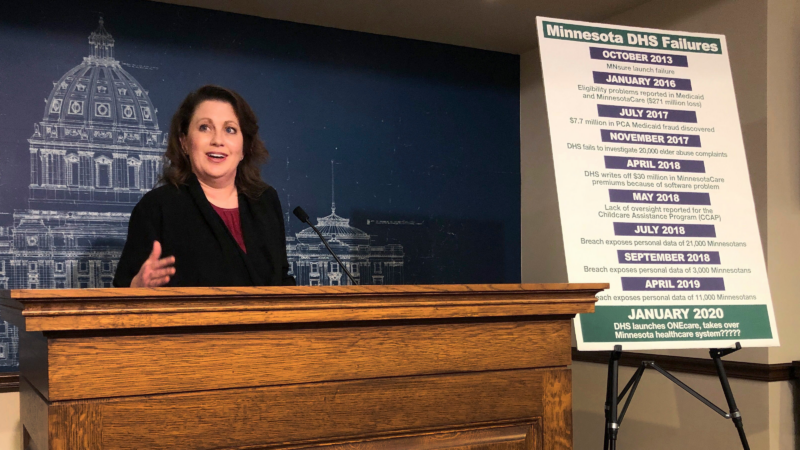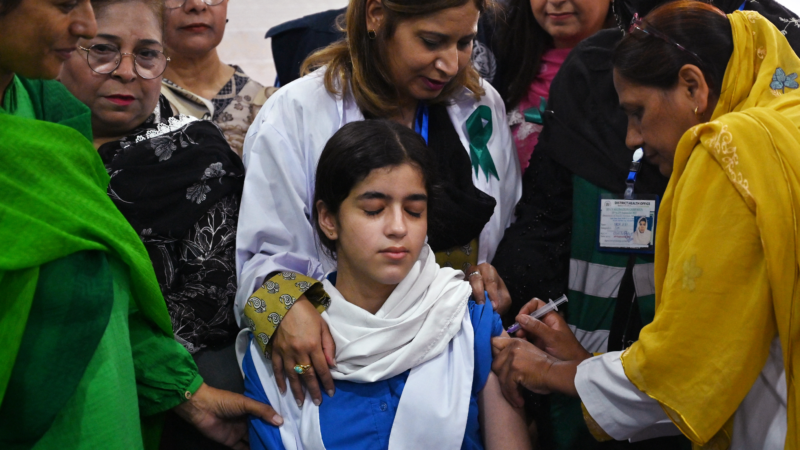Radio Free Asia announces mass layoffs amid funding fight with Trump administration
Radio Free Asia is laying off about 90 percent of its staff and is shutting down many of its language services, citing its inability to continue paying employees after the Trump administration cut off its funding.
“We are in an unconscionable situation,” Bay Fang, RFA’s president and CEO, said in a statement. “Because we can no longer rely on [the U.S. Agency for Global Media] to disburse our funds as Congress intended, we will have to begin mass layoffs and let entire language services go dark in the next week.”
This past March, President Trump ordered the U.S. Agency for Global Media (USAGM), the federal agency which distributes funds to RFA and other U.S. government-funded broadcasters, to wind down their operations to the bare minimum, in an effort “to reduce unnecessary governmental entities.”
Since 1996, RFA has broadcast in languages like Burmese, Cambodian and Mandarin to a weekly audience of around 60 million listeners.
It and the other U.S. government-funded broadcasters were set up in the wake of World War II, to reach listeners and readers living in what the U.S. considers repressive or authoritarian societies and to promote democratic values.
Combined, these broadcasters reached a weekly audience of more than 400 million people outside the U.S. around the world. In the last decade, RFA has broken stories on China’s detention campaign on ethnic Uyghurs and continued on-the-ground reporting in Myanmar in the midst of a civil war. Now only one staff member of the broadcaster’s Uyghur-language service remains, Mamatjan Juma, the former deputy director of the Uyghur language service, said in an interview with NPR.
“This work is more than a job for me and so many of the people who are part of RFA. They are immensely proud to be part of this team and see it as their life’s work to shine a light into the dark corners of the countries we cover,” Fang told NPR on Friday. ” So today was perhaps the most difficult in my career.”
After Trump’s directive in March, Kari Lake, a Trump senior advisor who effectively runs USAGM, promptly terminated congressionally-appropriated grants to Radio Free Asia and the other nonprofit news outlets funded by the U.S. government, including Radio Free Europe/Radio Liberty and Middle East Broadcasting Networks (MBN). She also shut down Voice of America, which is part of the government.
Lake, a former television anchor who lost an Arizona senate race last year, has called the agency she now effectively heads “unsalvageable.” “The rot is so bad. It’s like having a rotten fish and trying to find a little portion you can eat,” she said of USAGM in an interview with Newsmax in March.
VOA and the Office for Cuba Broadcasting, which runs Spanish-language programs, were forced to suspend more than 1,000 of their employees. RFA put about three fourths of its staff on unpaid leave.
In April, a federal judge in Washington D.C. ordered the administration to reinstate RFA and MBN’s funds and employees, saying the White House’s order to dismantle the broadcasters was “arbitrary and capricious.”
But this week, a D.C. appeals court granted an administrative stay, freezing that court order for RFA and MBN.
The following day, on Friday, RFA formally laid off many of its staff who were already on unpaid leave. RFA’s Fang says a skeleton crew still remains to update RFA’s much-pared back programming.
Trump administration says it’s freezing child care funds to Minnesota
President Trump's administration announced that it's freezing child care funds to Minnesota after a series of fraud schemes in recent years.
Flu cases are surging and rates will likely get worse, new CDC data shows
Flu season is off to a rough start this year, according to new CDC data. The virus is spreading faster than in previous years and the surge is likely to get worse. Here's what you need to know.
10 passion projects that stood out at the movies this year
NPR critic Bob Mondello narrows down his favorite movies of the year — the ones that made audiences vibrate.
Judge orders Trump administration to continue to seek funding for the CFPB
The order is the latest in a complex legal battle over the fate of the Consumer Financial Protection Bureau, a watchdog agency.
In a year of steep challenges, there were still shining moments in global health
The Trump administration's deep cuts in U.S. foreign health aid had a devastating impact. Yet there were achievements of note in spite of it all.
An escalation in Yemen threatens to reignite civil war and widen tensions in the Gulf
Saudi Arabia bombed Yemen's port city of Mukalla, targeting a shipment of weapons from the United Arab Emirates for separatist forces. The UAE later said it would withdraw its forces from Yemen.







